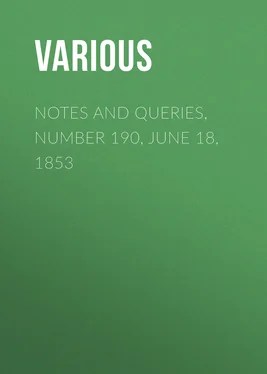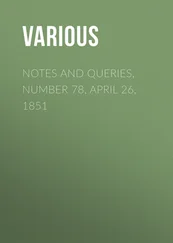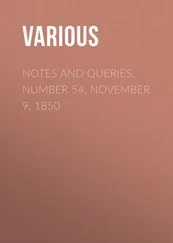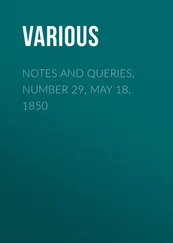Various - Notes and Queries, Number 190, June 18, 1853
Здесь есть возможность читать онлайн «Various - Notes and Queries, Number 190, June 18, 1853» — ознакомительный отрывок электронной книги совершенно бесплатно, а после прочтения отрывка купить полную версию. В некоторых случаях можно слушать аудио, скачать через торрент в формате fb2 и присутствует краткое содержание. Жанр: foreign_antique, periodic, foreign_edu, на английском языке. Описание произведения, (предисловие) а так же отзывы посетителей доступны на портале библиотеки ЛибКат.
- Название:Notes and Queries, Number 190, June 18, 1853
- Автор:
- Жанр:
- Год:неизвестен
- ISBN:нет данных
- Рейтинг книги:3 / 5. Голосов: 1
-
Избранное:Добавить в избранное
- Отзывы:
-
Ваша оценка:
- 60
- 1
- 2
- 3
- 4
- 5
Notes and Queries, Number 190, June 18, 1853: краткое содержание, описание и аннотация
Предлагаем к чтению аннотацию, описание, краткое содержание или предисловие (зависит от того, что написал сам автор книги «Notes and Queries, Number 190, June 18, 1853»). Если вы не нашли необходимую информацию о книге — напишите в комментариях, мы постараемся отыскать её.
Notes and Queries, Number 190, June 18, 1853 — читать онлайн ознакомительный отрывок
Ниже представлен текст книги, разбитый по страницам. Система сохранения места последней прочитанной страницы, позволяет с удобством читать онлайн бесплатно книгу «Notes and Queries, Number 190, June 18, 1853», без необходимости каждый раз заново искать на чём Вы остановились. Поставьте закладку, и сможете в любой момент перейти на страницу, на которой закончили чтение.
Интервал:
Закладка:
Various
Notes and Queries, Number 190, June 18, 1853 / A Medium of Inter-communication for Literary Men, Artists, Antiquaries, Genealogists, etc
Notes
ON THE USE OF THE HOUR-GLASS IN PULPITS
George Herbert says:
"The parson exceeds not an hour in preaching, because all ages have thought that a competency."— A Priest to the Temple , p. 28.
Ferrarius, De Ritu Concion. , lib. i. c. 34., makes the following statement:
"Huic igitur certo ac communi malo (the evil of too long sermons) ut medicinam facerent, Ecclesiæ patres in concionando determinatum dicendi tempus fereque unius horæ spatio conclusum aut ipsi sibi præscribant, aut ab aliis præfinitum religiosè observabant."
Bingham, commenting on this passage, observes:
"Ferrarius and some others are very positive that they (their sermons) were generally an hour long; but Ferrarius is at a loss to tell by what instrument they measured their hour, for he will not venture to affirm that they preached, as the old Greek and Roman orators declaimed, by an hour-glass."—See Bingham , vol. iv. p. 582.
This remark of Bingham's brings me at once to the subject of my present communication. What evidence exists of the practice of preaching by the hour-glass, thus treated as improbable, if not ridiculous, by the learned writer just quoted? If the early Fathers of the church timed their sermons by any instrument of the kind, we should expect their writings to contain internal evidence of the fact, just as frequent allusion is made by Demosthenes and other ancient orators to the klepshydra or water-clock, by which the time allotted to each speaker was measured. Besides, the close proximity of such an instrument would be a constant source of metaphorical allusion on the subject of time and eternity . Perhaps those of your readers who are familiar with the extant sermons of the Greek and Latin fathers, may be able to supply some illustration on this subject. At all events there appears to be indisputable evidence of the use of the hour-glass in the pulpit formerly in this country.
In an extract from the churchwardens' accounts of the parish of St. Helen, in Abingdon, Berks, we find the following entry:
"Anno mdxci. 34 Eliz. 'Payde for an houre-glasse for the pulpit,' 4 d. "—See Hone's Table-Book , vol. i. p. 482.
Among the accounts of Christ Church, St. Catherine's, Aldgate, under the year 1564, this entry occurs:
"Paid for an hour-glass that hangeth by the pulpitt when the preacher doth make a sermon that he may know how the hour passeth away."—Malcolm's Londinium , vol. iii. p. 309., cited Southey's Common-Place Book , 4th Series, p. 471.
In Fosbrooke ( Br. Mon. , p. 286.) I find the following passage:
"A stand for an hour-glass still remains in many pulpits. A rector of Bibury (in Gloucestershire) used to preach two hours, regularly turning the glass. After the text the esquire of the parish withdrew, smoaked his pipe, and returned to the blessing."
The authority for this, which Fosbrooke cites, is Rudder's Gloucestershire , in "Bibury." It is added that lecturers' pulpits have also hour-glasses The woodcuts in Hawkins's Music , ii. 332., are referred to in support of this statement. I regret that I have no means of consulting the two last-mentioned authorities.
In 1681 some poor crazy people at Edinburgh called themselves the Sweet Singers of Israel. Among other things, they renounced the limiting the Lord's mind by glasses . This is no doubt in allusion to the hour-glass, which Mr. Water, the editor of the fourth series of Southey's Common-Place Book , informs us is still to be found, or at least its iron frame, in many churches, adding that the custom of preaching by the hour-glass commenced about the end of the sixteenth century. I cannot help thinking that an earlier date must be assigned to this singular practice. (See Southey's Common-Place Book , 4th series, p. 379.) Mr. Water states that one of these iron frames still exists at Ferring in Sussex. The iron extinguishers still to be found on the railing opposite large houses in London, are a similar memorial of an obsolete custom.
I trust some contributor to the "N. & Q." will be able to supply farther illustrations of this custom. Should it be revived in our own times, I fear most parishes would supply only a half -hour glass for the pulpit of their church, however unanimous antiquity may be in favour of sermons of an hour's duration. One advantage presented by this ancient and precise practice was, that the squire of the parish knew exactly when it was time to put out his pipe and return for the blessing, which he cannot ascertain under the present uncertain and indefinite mode of preaching. Fosbrooke ( Br. Mon. , p. 286.) states that the priest had sometimes a watch found for him by the parish. The authority cited for this is the following entry in the accounts of the Chantrey Wardens of the parish of Shire in Surrey:
"Received for the priest's watch after he was dead, 13 s. 4 d. "—Manning's Surrey , vol. i. p. 531.
This entry seems to be rather too vague and obscure to warrant the inference drawn from it. This also may be susceptible of farther illustration.
A. W. S.Temple.
THE MEGATHERIUM AMERICANUM IN THE BRITISH MUSEUM
Amongst the most interesting specimens of that collection certainly ranges the skeleton of the above animal of a primæval world, albeit but a cast; the real bones, found in Buenos Ayres, being preserved in the Museum of Madrid. To imagine a sloth of the size of a large bear, somewhat baffles our imagination; especially if we ponder upon the size of trees on which such a huge animal must have lived. To have placed near him a nondescript branch (!!) of a palm, as has been done in the Museum here, is a terrible mistake. Palms there were none at that period of telluric formation; besides, no sloth ever could ascend an exogenous tree, as the simple form of the coma of leaves precludes every hope of motion, &c. I never can view those remnants of a former world, without being forcibly reminded of that most curious passage in Berosus, which I cite from memory:
"There was a flood raging then over parts of the world.... There were to be seen, however, on the walls of the temple of Belus, representations of animals, such as inhabited the earth before the Flood."
We may thence gather, that although the ancient world did not possess museums of stuffed animals, yet, the first collection of Icones is certainly that mentioned by Berosus. I think that it was about the times of the Crusades, that animals were first rudely preserved (stuffed), whence the emblems in the coats of arms of the nobility also took their origin. I have seen a MS. in the British Museum dating from this period, where the delineation of a bird of the Picus tribe is to be found. Many things which the Crusaders saw in Egypt and Syria were so striking and new to them, that they thought of means of preserving them as mementoes for themselves and friends. The above date, I think, will be an addition to the history of collections of natural history: a work wanting yet in the vast domain of modern literature.
A Foreign Surgeon.Charlotte Street, Bloomsbury Square.
REMUNERATION OF AUTHORS
In that varied and interesting of antiquarian and literary curiosities, "N. & Q.," perhaps a collection of the prices paid by booksellers and publishers for works of interest and to authors of celebrity might find a corner. As a first contribution towards such a collection, if approved of, I send some Notes made some years ago, with the authorities from which I copied them. With regard to those cited on the authority of "R. Chambers," I cannot now say from which of Messrs. Chambers's publications I extracted them, but fancy it might have been the Cyclopædia of English Literature . To any one disposed to swell the list of the remunerations of authors, I would suggest that Disraeli's Curiosities of Literature , Boswell's Life of Johnson , Johnson's Lives of the Poets and other works of every-day handling, would no doubt furnish many facts; but all my books being in the country, I have no means of searching, and therefore send my Notes in the fragmentary state in which I find them:—
Читать дальшеИнтервал:
Закладка:
Похожие книги на «Notes and Queries, Number 190, June 18, 1853»
Представляем Вашему вниманию похожие книги на «Notes and Queries, Number 190, June 18, 1853» списком для выбора. Мы отобрали схожую по названию и смыслу литературу в надежде предоставить читателям больше вариантов отыскать новые, интересные, ещё непрочитанные произведения.
Обсуждение, отзывы о книге «Notes and Queries, Number 190, June 18, 1853» и просто собственные мнения читателей. Оставьте ваши комментарии, напишите, что Вы думаете о произведении, его смысле или главных героях. Укажите что конкретно понравилось, а что нет, и почему Вы так считаете.












